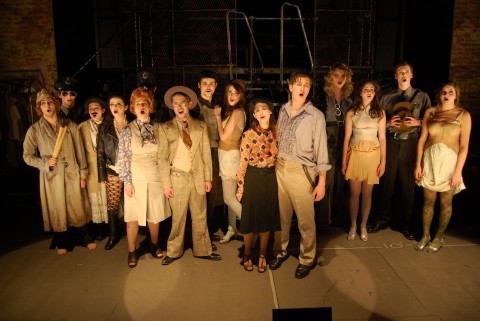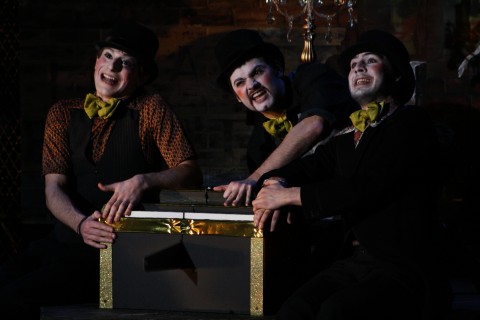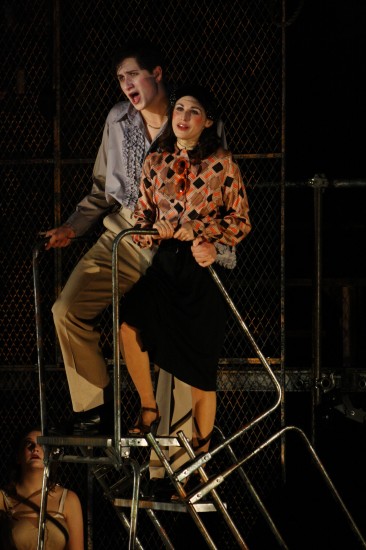
Photo by Andrew Nathanson
I decided to go in cold. I went to the preview show of The Threepenny Opera, presented by the Connecticut College Theatre Department, last Wednesday night knowing nothing but the title, and what I could glean from the incredibly creepy posters around campus. It was a musical, something I had assumed from the title, but much different from the bright, campy shows I usually associate with musical theatre. It was a comedy with a serious set of themes and a show that I found mostly enjoyable due to the great production.
The play began with a street singer (played by Kadie Greenfield ’11) introducing the setting and the main character in perhaps the only cheery upbeat song in the whole play (despite its lyrics about murder and crime), that being “The Ballad of Mack the Knife.” The song, commonly known as “Mack the Knife,” was made popular by Louis Armstrong and Bobby Darin. On the seedier side of London, during some indeterminate time period, there lives a clever criminal named Macheath, aka Mack the Knife (Julian Gordon ’14). He is known by all in town, and when Mr. Peachum (Ryan Cameron ’12), the character on which the play opens, finds out that his daughter plans to wed this criminal, he is enraged.
Peachum is a hard, angry man who runs a business hiring beggars, dressing them up to elicit pity from the people and taking a cut of their earnings, all while quoting the Bible and lamenting the decline of charity (one of the many satirical prods at morality masking greed in the play). He runs the shop along with his wife (Izzy Brown ’12), and when they both realize exactly who their daughter has been involved with, they’re distraught.
Meanwhile, the slap-dash wedding, stitched together with stolen goods, is already taking place in what seems to be Macheath’s den of thieves. Polly Peachum (Julie Bergstein ’12) is a young, innocent girl, and so absolutely enamored with Macheath that she can see no wrong in him. Macheath is slimly, but slick and cunning. Although it seems he really does have feelings for Polly, it quickly becomes evident that his loyalty to anyone but himself wavers with even the slightest breeze.
When Polly returns home, she proudly tells her parents of their marriage, and stubbornly refuses to reconsider. The Peachum parents step their plan into high gear, scheming to have Macheath finally hanged for all his crimes. This proves difficult because of Macheath’s friendship with Tiger Brown (Tim Swan ’13), the police commissioner, and the relationship with his daughter, Lucy (Grant Jacoby ’13). And thus the plot is put in place as the Peachums work with Macheath’s past lover Jenny (Susanna Kavee ’11) to track Macheath down, set a trap and see him swing from the gallows.
The plot is somewhat complex, especially when it comes to the exact motivations of each character, but the cast carried the audience through it well with great acting all around. The standout performances would have to be from Gordon, who was excellent at being both the suave slimy criminal in the beginning and the more frantic death row inmate at the end; Cameron, who was perfect as the angry over the top hypocrite Peachum; and Kavee, who brought out maybe the only sympathy from the audience as the bitter heartbroken prostitute. There has to be a special mention of Jacoby, who was hilarious as Lucy, Macheath’s full woman wife and lover. All of the singing was fantastic as well, with an especially good vocal performance from Brown as Mrs. Peachum.

Photo by Miguel Salcedo
The set was modest but effective; a grafittied brick wall which instantly informed the audience to the setting as well as some versatile scaffolding and props. Lights, costumes and sound were all fine. The only minor problem I had with the production was the instrumental work; it sounded occasionally sloppy. However, I kept in mind that I was technically watching a dress rehearsal and that perhaps what I perceived as a few spots of messy playing were intentionally so in order to add to the theme of a “beggars opera” (which is how the play is introduced).
When exiting the play, I asked the opinions of some other students who attended the preview to gauge the audience reaction. Victoria Leads ’11 was extremely positive. “I loved the music, the performances were so lively and the set was unbelievable.”
Martina Rudolf ’14 was similarly positive. “I really liked it, and thought the whole thing was really well done.” She also had the unique perspective of just having read the play for a class. “We just read Threepenny, actually, in my Berlin class, and I thought the musical was good, but I think if I hadn’t read the play it might be a little hard to follow.”
This opinion was complimented by another freshman, Tony Knapp, who hadn’t had any exposure to the play before. “I appreciated the acting, the set design, the light design, but the script itself was confusing. I didn’t understand what the songs were referring to and none of the characters were likeable.”
Knapp’s qualms encompass some of my own. This is a funny play, but not a happy one. That’s not a bad thing – in fact it’s refreshing in comparison to those saccharine musicals of constant cheer – but this play gets a bit too heavy at points. It’s never sad, but it’s frequently pessimistic. I felt like almost every song began about the characters and their situation and then quickly spiraled into a critique on capitalism, or a commentary on the innate immorality of human kind, or an argument about how no-one is untouched by greed and corruption. Again, this isn’t necessarily a bad thing. I like a play that remains steadfast in its themes and I love a play that makes the audience think, but it lead to a lot of moments of “Wait, what are they singing about?” which distracted from the overall story multiple times.
A problem I think many people will have with the play is that the characters are almost entirely unrelatable, mean and immoral in one way or another. But this, I think, is by design. Threepenny is trying to be different from so many other plays which give you an obvious hero to root for. It even pokes fun at unrealistic cheerful finales with its hilarious Deus ex Machina, which saves Macheath from death, and is followed by the street singer singing “Happy endings, that’s the rule here.”
And despite my issues with The Threepenny Opera, it was a happy ending for both the characters and the audience. I would call it a strange choice for the theatre department to choose this play over others, but ultimately a good choice. Threepenny is a unique show that was presented with great production. The humor, talent and music shined through the play’s dark and depressing themes. •

Photo by Miguel Salcedo









